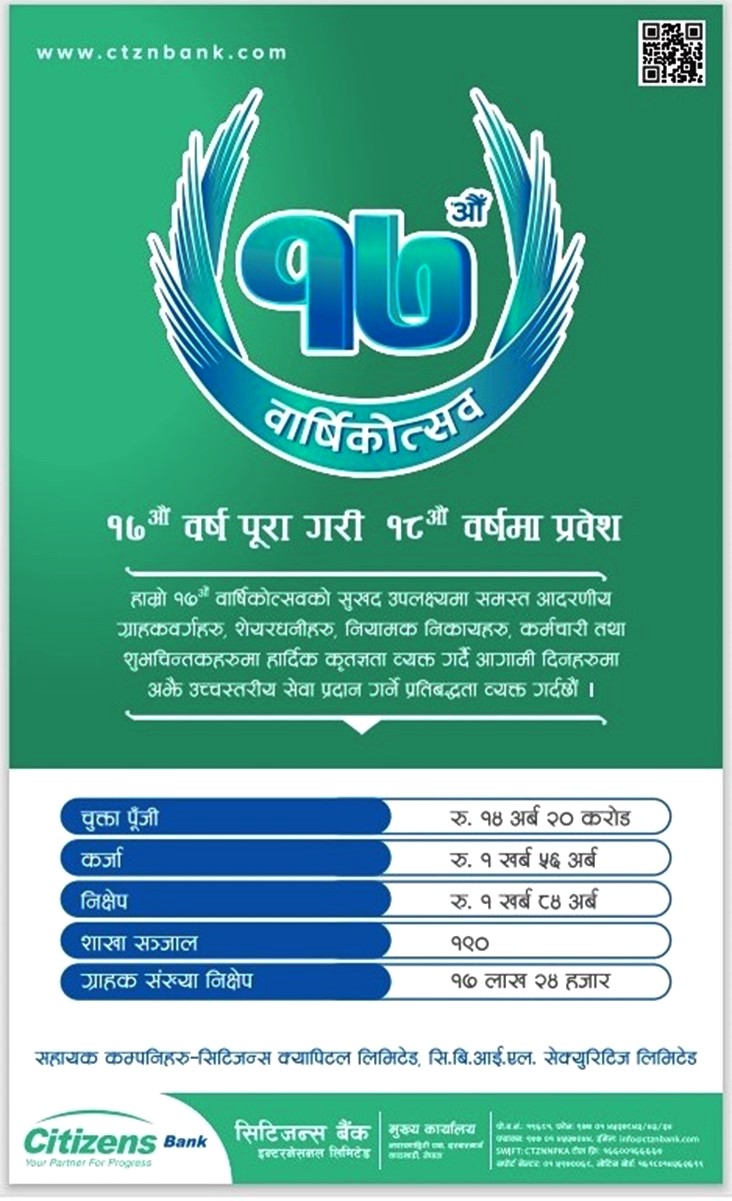 -Sanubaba Prasai,
-Sanubaba Prasai,
The Nepal Rastra Bank (NRB), in the capacity of the central bank, is responsible to controlling and running the nation’s monetary system. The central bank is run by the Governor among capable, experienced and responsible employees. It functions as the government and the nation’s chief advisor on economics. The Rastra Bank is given high priority so as to effectively run the monetary policy. While maintaining a strict control over money supply system Nepal Rastra Bank balances its acts in regard to controlling the money circulation and inflation in the nation. However, the Rastra Bank’s prejudicial policy to stop the use of the banknotes depicting the Kings’ picture by mid of March has instilled terror in Nepali people. The central bank has forgotten other important duties.
The Rastra Bank has unnecessarily made its fine head ache by taking such a decision. It has put the straight forward Nepali people into illusion by following the direction of political regime. In this sense the governor and chief officials of the bank are wrong. So it is not morally right for those who have lost their credibility to remain seated in the official positions. I worked in the Agriculture Development Bank for 23 years. I had developed a confidence and dependence towards the Rastra Bank with which I worked. Now witnessing the prejudice with which the Rastra Bank has fallen into the political trap my confidence in it has been shattered.
The Rastra Bank withdrew its decision to remove the notes with the Kings’ pictures the next day accepting that its decision was taken unscrupulously and mistakenly. Nevertheless the Bank’s former notice had instilled fear in the people. Who should take the responsibility for this fiasco other than them? The Bank had not carried out a prior research into the living standard of the Nepali people, and took such a bias decision that made many suffer. The Bank’s employees cannot remain free from such sin. A decision had already been taken not to print anymore of the notes with the King’s picture, and it was effectively followed. So the rumpled notes had been exchanged and the banknotes were supplied sufficiently. It is a good thing to dispose of rumpled and wrinkled notes. The new notes with the Kings’ picture are taken to be history’s source. Nepal is facing an interim period. The constitution is interim, the government interim. There used to be a King in Nepal, now there are notes with the Kings’ picture. The Rastra Bank adopted a wrong policy by contradictorily refusing to use the notes it had printed and abandoning its monetary policy. In what sense and what moral ground are the employees and officials that worked in this period of slack in the Bank’s policy still holding job. Although many days have passed still the notes with the Kings’ picture is not in use in the market. The people are still suffering.
The Rastra Bank had issued a notice that the banknotes depicting the Kings’ picture would not be exchanged after March 15 onwards. Many people had to return frustrated when other banks refused to exchange their notes. It is heard that there are notes depicting the King that amounts to {10…..} in the market. A decision was taken from a facilitated area of Kathmandu. Wouldn’t those villagers hastily heading to exchange bundles of notes have been looted by thieves? Would these people desperately looking for money have hesitated in murdering these people? Wasn’t it unfortunate for the nation that the money that poor people earned by toiling with stones, pebbles and staying guard in foreign nations was neglected here? The nation is moving through a crisis ridden, violent and insecure situation. Are the villages more secure than Kathmandu when the former city is faced with daylight robberies? It is unfortunate that the Rastra Bank fails to understand if the illiterate and those without identity papers would ably carry bundles of notes.
कुनै पनि राष्ट्रको नोट भनेका हजारौं बर्षसम्म पनि खोटा हुँदैनन् । यस्तो तथ्यलाई नकारेर फेरि राष्ट्र वैंकले २०६८ बैशाख २० गते फेरि पूर्व राजाहरुका तस्वीर अंकित नोटहरु बिस्तापित गराउने जुन अव्यवहारिक र जनबिरोधी कार्य गर्न खोजेको छ त्यस्तो निर्णय गर्ने राष्ट्र बैंकका गभर्नरलगायत कर्मचारीहरुको लागि अक्षम्य हुने छ । उनीहरु दण्डनीय हुनेछन् ।
The banknotes depicting the picture of Kings Tribhuvan, King Gyanendra-2007, King Mahendra, King Birendra and King Gyanendra are made the prisoner of indecisiveness. Can Nepal’s monetary policy be good? How much had it cost to print new notes and how much will it cost to print new ones? Many Nepali people are of such thinking capacity that they keep the bundles of notes in a box or pit. They do not listen to radio, look at television and read newspapers. They don’t have the capacity neither they try to keep one. They will have the notes of King Tribhuvan and King Mahendra kept in some secure place. A governor who is born in a rural area as Taplejung must have known this. How big a mistake was that of the Rastra Bank? They will not ever contemplate that ever there would a time come when their notes will not be in use. They would not believe that the government would terrorize the people by disposing of the notes. What answers can the Rastra Bank give to the people that have suffered at the hands of its wrong act, and the resultant problems that have come forth? The lack of Nepali notes in the nation has brought in the use of Indian currency notes in high amount. Has this monetary institution no shame?
After the notification of the Rastra Bank the Rs. 500 notes were exchanged for Rs. 200 and Rs. 1000 notes for Rs. 500 in villages. It is a sad event that a handful of frauds turned the decision of the Rastra Bank into a business and fleeced the poor people. How much they must have earned? The people in villages after hearing of the Rastra Bank’s notice ran hurriedly to the nearest place to exchange their notes. Was it right for the central bank to change the nation’s monetary policy in support of a political system? The notes depicting the King’s picture, production of which had already been stopped, would have been gradually replaced by new ones. It had been in operation for so many days. What would have gone wrong had it run for a few more days? Then why were the coins with pictures of Kings engraved in it allowed to be in use? It is right thing to replace the old rumpled notes with the King’s picture. But the Rastra Bank made a big mistake by trying to replace the new notes with the King’s picture. If the nation can be run under sole dependence of the republicans then why not disregard the notes of Japan, Denmark, Thailand, Saudi Arabia including others with the picture of their Kings and Emperors? Why not disregard the notes with Britain’s Queen’s pictures? Why depend on economic support from these nations to govern Nepal? The central bank which functions as the backbone of the nation’s economy fails to be answerable to the Nepali people, which is hilarious in context of world’s monetary system. Regardless of who says what; then the Rastra Bank had invited a monetary crisis by taking a decision in the interest of those inclined to commissions, and mafia.
 Yes, change is a common phenomenon in the nations of the world. However, if a monetary system changes with the change in the government then may it not be considered an attempt to make the sovereign people of a sovereign nation suffer? This does not fall under the duty of any government nor bank? Not a single economist spoke against the decision to remove the notes with the King’s picture. Economists indulge in political sycophancy and only know how to retain their job. It is their duty to analyze the economic system within the nation. However the change in monetary system has an impact on the economic policy of the nation. It is an incident taking place for the first time in Nepal’s history that a note with the King’s picture is being vindictively removed. The Rastra Bank which holds all the responsibility relating to monetary system is a national institution. It is our request that the Rastra Bank refrain from any wrong decisions in the future.
Yes, change is a common phenomenon in the nations of the world. However, if a monetary system changes with the change in the government then may it not be considered an attempt to make the sovereign people of a sovereign nation suffer? This does not fall under the duty of any government nor bank? Not a single economist spoke against the decision to remove the notes with the King’s picture. Economists indulge in political sycophancy and only know how to retain their job. It is their duty to analyze the economic system within the nation. However the change in monetary system has an impact on the economic policy of the nation. It is an incident taking place for the first time in Nepal’s history that a note with the King’s picture is being vindictively removed. The Rastra Bank which holds all the responsibility relating to monetary system is a national institution. It is our request that the Rastra Bank refrain from any wrong decisions in the future.
The Author can be reached at :[email protected]




प्रतिक्रिया